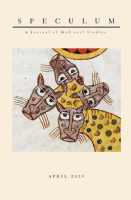
SPECULUM-A JOURNAL OF MEDIEVAL STUDIES
Scope & Guideline
Enriching Knowledge of the Medieval World
Introduction
Aims and Scopes
- Medieval Literature and Textual Studies:
The journal emphasizes the exploration of medieval literature, including textual analysis, manuscript studies, and the evolution of literary forms. This includes works from notable authors such as Chaucer and Dante, as well as lesser-known texts. - Cultural Interactions and Exchanges:
A significant area of focus is the examination of cultural exchanges between different societies during the medieval period, including interactions between Christians, Jews, and Muslims. This includes studies on the impact of trade, migration, and conquest on cultural identities. - Art and Visual Culture:
The journal highlights the significance of art and visual culture in the medieval world, exploring topics such as iconography, architecture, and the role of visual arts in religious and secular contexts. - Social History and Gender Studies:
Research exploring social structures, class dynamics, and gender roles in medieval societies is prevalent. This includes studies on the lives of women, the aristocracy, and marginalized communities. - Religious and Philosophical Thought:
The journal also delves into the theological and philosophical developments of the medieval era, examining the influence of key figures and the interplay between faith, reason, and societal norms. - Historical Methodologies:
SPECULUM encourages innovative historical methodologies, including interdisciplinary approaches that integrate archaeology, anthropology, and literary criticism to enrich the understanding of medieval societies.
Trending and Emerging
- Interdisciplinary Approaches:
There is a growing trend towards interdisciplinary research that combines history with fields such as gender studies, cultural studies, and environmental history, reflecting a broader understanding of medieval society. - Postcolonial and Global Perspectives:
Research that examines medieval history from postcolonial and global perspectives is on the rise. Scholars are increasingly exploring how medieval societies interacted with and influenced each other across geographical boundaries. - Studies on Race and Ethnicity:
The exploration of race and ethnicity in medieval contexts is gaining prominence, with scholars investigating how these concepts were constructed and represented in medieval literature and society. - Digital Humanities:
The integration of digital tools and methodologies in medieval studies is becoming more prevalent, allowing for innovative approaches to manuscript studies, text analysis, and visualization of historical data. - Environmental History:
An emerging focus on environmental history examines the relationship between medieval societies and their natural environments, addressing issues such as resource management, climate change, and ecological impacts.
Declining or Waning
- Traditional Military History:
There has been a noticeable decrease in publications focused solely on traditional military history, such as detailed battle accounts or strategies, as scholars increasingly incorporate broader social and cultural contexts into their analyses. - Solely National Perspectives:
Research that emphasizes singular national perspectives, particularly in isolation from transnational or comparative approaches, appears to be declining. Scholars are now more inclined to adopt global or interconnected viewpoints. - Static Interpretations of Iconography:
The interpretation of iconography in isolation has waned, with scholars preferring to contextualize artworks within broader cultural, social, and historical frameworks rather than focusing solely on iconographic analysis. - Exclusive Textual Analysis:
Papers focusing exclusively on textual analysis without considering the socio-political or cultural implications of the texts are becoming less common. There is a growing trend towards integrating textual studies with interdisciplinary methodologies. - Narrowly Defined Religious Studies:
Research confined to narrow religious contexts without considering the interactions between different faiths and their broader societal implications is becoming less prevalent.
Similar Journals

Listy Filologicke
Exploring the Intersections of History, Language, and Literature.Listy Filologicke is a distinguished academic journal published by the Institute of Classical Studies at the Academy of Sciences of the Czech Republic, focusing on the interdisciplinary fields of History, Linguistics and Language, and Literature and Literary Theory. With an ISSN of 0024-4457 and an E-ISSN of 2570-9410, this journal has been a pivotal platform for scholarly discourse since its convergence years began in 2003. Notably, it holds a Q3 classification in History and Linguistics and Language, and a Q2 in Literature and Literary Theory as of 2023. Its rankings within Scopus illustrate its relevance and impact in academia, with noteworthy positions in the Arts and Humanities and Social Sciences categories. Researchers, professionals, and students will find Listy Filologicke an invaluable resource for exploring cutting-edge research, critical analyses, and discourse that contribute significantly to their respective fields. Based in the heart of the Czech Republic, it continues to promote scholarly excellence and foster international collaboration.
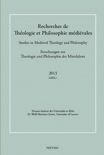
Recherches de Theologie et Philosophie Medievales
Fostering Dialogue on Medieval Intellectual HeritageRecherches de Theologie et Philosophie Medievales is a distinguished scholarly journal dedicated to the exploration of medieval theology and philosophy, published by PEETERS in Belgium. With an ISSN of 1370-7493 and an E-ISSN of 1783-1717, it has become an essential resource for researchers and scholars within its domain since its inception in 1996. This journal occupies a notable position, recognized in the Q3 category across critical fields such as History, Philosophy, and Religious Studies in 2023, showcasing its valuable contribution to academic discourse. The journal ranks impressively in Scopus, holding positions of #202, #576, and #327 in Religious Studies, History, and Philosophy respectively, placing it in the 68th, 67th, and 59th percentiles. Though it operates under traditional access models, its rigorous peer-reviewed articles provide in-depth analyses and perspectives that are invaluable for students, academics, and professionals alike, making it an indispensable component of medieval studies.
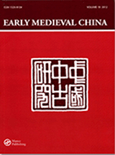
Early Medieval China
Illuminating the Rich Tapestry of Early Medieval ChinaEarly Medieval China is a distinguished journal published by ROUTLEDGE JOURNALS, TAYLOR & FRANCIS LTD, specializing in the intricate study of early medieval China through an interdisciplinary lens that encompasses Anthropology, Cultural Studies, History, Literature and Literary Theory, Philosophy, and Religious Studies. With a commendable impact factor and a prestigious standing in various quartile rankings, such as Q1 in Literature and Literary Theory and Q2 in Cultural Studies and History for 2023, this journal serves as a vital resource for scholars, researchers, and students alike. It aims to promote a deeper understanding of China's early medieval period by publishing innovative research, critical essays, and comprehensive analyses that contribute to the broader discourse on Asian studies and history. By offering a platform for cutting-edge research, Early Medieval China plays an essential role in enriching academic dialogue and fostering further explorations in this historically significant field.

STUDI MEDIEVALI
Reviving the Voices of the Medieval WorldSTUDI MEDIEVALI, published by the Centro Ital Stud Sull Alto Med, is a premier journal dedicated to the exploration of medieval studies, focusing on both cultural and historical dimensions. Since its inception in 2002, this journal has become an essential resource for scholars and students alike, providing critical insights into the complexities of the medieval era. Although it currently operates under a traditional access model, its contributions to the field are undeniable, with a 2023 ranking in the fourth quartile for Cultural Studies and History categories in Scopus rankings, highlighting its niche yet valuable position within academic discourse. Based in Spoleto, Italy, the journal serves as a platform for innovative research and interdisciplinary dialogue, inviting contributions that challenge conventional understandings and stimulate further inquiry into medieval life. Researchers and professionals will find in STUDI MEDIEVALI an opportunity to engage with a community of passionate scholars dedicated to uncovering the multifaceted realities of the medieval period.

Filologia Mediolatina
Advancing Scholarship in Medieval PhilologyFilologia Mediolatina is an esteemed academic journal dedicated to the study of Medieval Latin philology, published by SISMEL EDIZIONI GALLUZZO in Italy. With an ISSN of 1124-0008, this journal provides a critical platform for researchers, professionals, and students to explore the intricate relations between language, culture, and textual analysis in the medieval period. Although its impact factor is not specified, Filologia Mediolatina falls within the Q4 category in the Linguistics and Language field as of 2023 and holds a notable rank in the arts and humanities sector, highlighting its niche yet vital role in the academic community. The journal offers insights into linguistic evolution and historical texts, making it a valuable resource for those engaged in these disciplines. It has continued to publish relevant articles from 2015 to 2023, contributing to scholarly discussions and enriching the knowledge base in medieval studies.
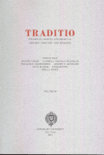
TRADITIO-STUDIES IN ANCIENT AND MEDIEVAL HISTORY THOUGHT AND RELIGION
Engaging with the Complexities of Past Cultures and IdeasTRADITIO - Studies in Ancient and Medieval History, Thought and Religion is a distinguished academic journal published by Cambridge University Press, dedicated to the exploration and analysis of historical, philosophical, and religious narratives from ancient and medieval periods. The journal's ISSN is 0362-1529 and its E-ISSN is 2166-5508. Renowned for its rigorous scholarship, it enjoys a notable standing in the academic community, reflected in its 2023 category quartiles which place it in the second and third tiers across critical fields such as Literature and Literary Theory, Philosophy, Religious Studies, and Visual Arts and Performing Arts. With its comprehensive scope that encompasses multidisciplinary approaches, TRADITIO provides an essential platform for researchers, academics, and students alike to engage deeply with the complexities of historical thought and cultural practices. Although the journal operates within the traditional subscription model, its significance is underscored by impressive Scopus rankings, indicating its high visibility and impact within the arts and humanities sectors. We invite you to discover the richness of ancient and medieval studies through the pages of TRADITIO.

Revista Chilena de Estudios Medievales
Bridging Eras: Where Medieval Studies Meet Modern InquiryRevista Chilena de Estudios Medievales, published by Universidad Gabriela Mistral, is a premier open access journal that has been serving the field of medieval studies since 2012. With its unique ISSN 0719-2215 and E-ISSN 0719-689X, this journal provides a vital platform for scholars, researchers, and students interested in the rich tapestry of medieval history, literature, and culture. Located in Santiago, Chile, at Ladislao Errazuriz 2073, Providencia, Santiago 00000, the journal aims to foster a deeper understanding of the medieval period through interdisciplinary research and insightful articles. While impact factors and HIndex data are currently unavailable, the journal is dedicated to maintaining high academic standards and promoting knowledge dissemination in the field. Its open access model ensures that research is freely available to the global community, thereby enhancing engagement and collaboration among medieval studies scholars. Join us in exploring the depths of the medieval world through Revista Chilena de Estudios Medievales.
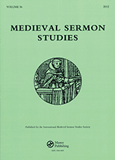
Medieval Sermon Studies
Bridging Literature and Theology through SermonsMedieval Sermon Studies is a distinguished academic journal dedicated to the exploration of medieval sermons and their impact on literature and religious discourse. Published by Routledge Journals, Taylor & Francis Ltd, this journal has become a vital resource for scholars within the fields of Literature and Literary Theory, as well as Religious Studies. With its ISSN 1366-0691 and E-ISSN 1749-6276, it spans a decade of exceptional scholarship from 2013 to 2023. Although currently categorized as Q3 in Literature and Literary Theory and Q4 in Religious Studies according to the 2023 quartiles, the journal plays a crucial role in stimulating critical dialogues and fostering interdisciplinary research. Accessing its insightful content, while not available through Open Access, provides unique opportunities for students, researchers, and professionals to engage with the nuances of medieval rhetoric and theology. As the discourse within this field continues to evolve, Medieval Sermon Studies stands at the forefront, encouraging innovative scholarship and preserving the rich heritage of medieval thought.

Reti Medievali Rivista
Exploring the Depths of Medieval HistoryReti Medievali Rivista, published by FIRENZE UNIV PRESS, stands as a distinguished platform in the field of history, specifically focusing on the medieval period. With an ISSN of 1593-2214, this journal has embraced Open Access since 2000, ensuring that its scholarly content is readily available to researchers, students, and professionals worldwide. Based in Italy, the journal boasts a Q2 ranking in the Category of History according to the 2023 quartiles, reflecting its significant impact and contribution to the discipline. With a Scopus rank of #809 out of 1760 in the Arts and Humanities category, it sits comfortably within the 53rd percentile, affirming its quality and relevance in the academic community. The journal's scope encompasses a wide range of topics related to medieval studies, making it an invaluable resource for those seeking in-depth research and analysis in this pivotal era of history. Scholars are encouraged to explore its diverse articles and insights, further enriching the dialogue surrounding medieval scholarship.
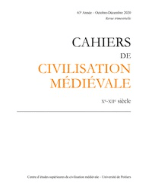
CAHIERS DE CIVILISATION MEDIEVALE
Illuminating History, Literature, and Art of the Medieval EraCAHIERS DE CIVILISATION MEDIEVALE is a distinguished scholarly journal focusing on the multifaceted aspects of medieval civilization, including its history, literature, visual arts, and performing arts. Published by the CENTRE ETUD SUPERIEUR CIV MED in France, this journal serves as a vital resource for researchers, professionals, and students striving to deepen their understanding of the medieval period. Although the journal’s impact factor and HIndex are not explicitly listed, it has been categorized in Q4 for 2023 in key areas such as History and Literature, indicating its role within niche academic discussions. With content spanning converged publication years from 2002 to 2014 and 2017 to 2023, CAHIERS DE CIVILISATION MEDIEVALE aims to foster a rich dialogue among scholars in the field, while its accessibility options provide a pathway for the dissemination of knowledge. Dive into the intricate world of medieval studies through this essential publication, which seeks to elevate the discourse and provide a platform for innovative research.